
|
Time of Underground Uplift, Mighty blasts of The Word. Time of Futurism, Time of Confidence. Time of Revolution, through flowers, herbs, and through Free Speech, Incorporated, founded by R.W., gay, atheist, john. I recall a vision. It is R.W., "an arrogant card-carrying swish," riding the subway. I follow him through corridors. His, a swift gait, His, a loud mouth. An American voter, he, persevering, whining, enjoying a good cackle, holding tight to skepticism and his purse, generous to the undeserving, Odd revolutionary, praising Calvin Coolidge. I see, spread from coast to coast, a myriad of buttons, speaking the unspeakable, in keeping with R.W., giving body to anarchism's era.
Raj Ayyar: Randy, it's a shame that we are doing this interview long-distance. I miss your impish presence, your crackling wit and great fund of anecdotes. Tell me, behind the various flamboyant public selves, who is Randy Wicker? And how did Charles Gervin Hayden, Jr. become Randolfe Wicker? Randolfe Wicker: Charles Gervin Hayden, Jr. was my given name. My father must have been one of those people who believed his son would be the second him, a junior him, Jr., his clone. When I told him about my activities as a gay spokesperson for the Mattachine Society in the late 1950s, he simply said: "I don't think you are going to get very far with this. But just do me one favor, don't involve my good name." So, my father gave me his name at birth and took it back when I was twenty years old. I choose the name 'Randolfe" because it seemed so elegant. I saw a movie where Zachary Scott played someone named "Randolph". I knew Donald Webster Cory, the author of The Homosexual in America had added the middle name "Webster" because his publishers were afraid someone named Donald Cory would sue them. So, I decided I would create an unusual spelling, "Randolfe", to insure my originality. Actually, when I changed my name legally in 1967, I kept my given last name as a middle name, Randolfe Hayden Wicker. That is one reason I usually put in the middle initial in Randolfe H. Wicker. That 'H" connects me to my given-name birth-family. The New York Times once described "Randolfe Wicker" as a pseudonym. I was furious. I wrote a letter pointing out that I paid my taxes as Randolfe H. Wicker, that that was the name on my passport, etc.
Samuel Goldwyn of Metro Goldwyn Mayer put it very well: "A self-made man needs a self-made name." he had changed his last name from a long unspeakable Polish name to "Goldwyn". Also, I had made it a goal in life in my early twenties to "be able to be Randolfe Wicker twenty-four hours a day". When I finally started my first successful business, I was able to make that a reality by legally changing my name. Raj Ayyar: In Before Stonewall Jack Nichols quotes Arthur Maule of the Mattachine Society as saying that you were a 'disturbing acquisition.' You've certainly played gadfly to various movements: gay liberation, the '60's counterculture, now cloning. Do you enjoy making waves? Randolfe Wicker: Anyone who really thinks and speaks for himself makes waves. I've always liked challenging stereotypical thinking. I would have preferred to be a beloved popular political leader. However, I found that required being two-faced and duplicitous. At the minimum being a beloved political leader requires compromising away most of what you believe in to achieve popularity. In college, I was nearly elected President of the Student Body (University of Texas, 1960). I discovered I had the ability to get attention, to inspire from afar, to create waves. However, I was hopelessly incapable to creating consensus. So, I embraced the role of "gadfly" because it was what I was best at. Raj Ayyar: It has been observed that there are at least two Randy Wickers: the cutting-edge anarchist, the imp of gay liberation, the prophet of a new outlook on the one hand and on the other, a quirky economic conservative who loves the almighty dollar and admires Calvin Coolidge. How do these selves coexist in peace, balance and harmony? Randolfe Wicker: Politically, I have traveled the spectrum. I began as a democratic socialist in my youth - an early supporter of Castro who became disillusioned when he failed to have promised elections and became totally disillusioned when he commenced rounding up gays and putting them into rehabilitation camps. Then I became an enrolled member of the Liberal party in NYC, then a Democrat, then (in 1975) an enrolled Republican (for twelve years) who liked the liberal wing of that party but was also attracted to the libertarians and their idea that the best government was the least government. AIDS made me realize that it didn't matter how much the economy was growing if your friends were sick and needed medical care. I returned to the Democratic Party and consider myself to be a Bill Clinton Democrat today. Because I have made this journey, I can understand almost every political argument because at some time, I have embraced it. If nothing else, I've learned in life that what you believe tomorrow might be quite different from what you believe in today.
Randolfe Wicker: Underground Uplift Unlimited was a slogan button and poster head shop I ran on St. Marks Place in East Village between 1967 and 1971. It was my first successful business. I met Ginsberg during my involvement with LeMar during the mid 1960s. A friend had turned me on to pot and I thought it was fabulous. Just like the stickers we plastered all over the subways said: "Smoke Pot: It's Cheaper and Healthier than Alcohol!" Five of us edited The Marijuana Newsletter. Ginsburg and the others made me the first listed editor. I guess they figured if someone was going to get busted, it was better to have Wicker take the fall. I once got a ticket for selling The Marijuana Newsletter on Bleeker Street. The ACLU took the case and the ticket was dismissed. I liked Allen Ginsburg. He was warm and friendly, always hugged me when we met. I viewed him as something of a wimp when it came to gay liberation because he did nothing for the movement in an organized sense before Stonewall. He actually did a great deal for homosexuality in general by publishing his poem Howl and being an opening gay man during the 1950s and 1960s. His sexual preferences seemed to be for males in their mid teens although he had a long term relationship with Peter Orlovsky who was somewhat younger and mentally quirky or ill. My experiences running a head shop in the center of East Village caused me to become disillusioned with pot and psychedelic culture in general. Ultimately, I couldn't stand that environment anymore. I closed the shop and appeared on a national documentary criticizing the whole scene. Like I said earlier, you live and learn in life. And that changes your opinion about politics and life and drug use. The LSD trips I had in those days remain among the most extraordinary adventures I've had in life. However, I really wouldn't risk repeating them today.
Of course, I have helped all the causes I have championed. I produced the first radio show in which homosexuals spoke for themselves. Someone tried to get WBAI's license revoked for broadcasting that show. When the FCC ruled that homosexuality was a legitimate topic for discussion, all the airwaves opened up for us. That was part of the educational process that made "Stonewall" possible. Homosexuals had slowly gotten to the point of having enough self respect that they finally decided: "We aren't going to let them treat us like this any more." Even though I went back to alcohol (Drink Alcohol: it is cheaper and healthier than pot!), I am proud of being part of the process that broke the stereotype that pot was as addictive as heroin. Today, people understand that smoking pot is more like having a drink than it is like sniffing cocaine, injecting heroin and smoking crack. That understanding is what makes the current debate about medical marijuana (which I support) possible. Ultimately, I decided that smoking pot--like drinking alcohol and smoking cigarettes- should be discouraged. I embraced the concept of "decriminalization" in place of "legalization". With decriminalization, pot would remain a 'forbidden substance' which could be seized and taken away. However, no one could be charged with a 'criminal offense' for possession. possibly not even for sale. That would keep people from ending up with records for harmless offenses. However, your local apothecary wouldn't be touting the latest, most potent brand of weed. Dealing could be discouraged by raiding and seizing the supplies as contraband. You could draw a parallel between that and the legal position that what consenting adults do in the privacy of their homes is of no concern of the law just as long as "they don't do it in the streets and scare the horses". Raj Ayyar: Was your own coming-out process painful, or did you swim through it with your usual panache and aplomb?
We had this in the New York Mattachine Society. Our largest committee, 'the West Side Discussion Group", was really mainly a social club. They held socials once a week (Wednesday nights) where people could meet and mingle in a setting quite different from a gay bar. Ironically, WSDG survived for years and years after the Mattachine Society had disappeared. People loved to have somewhere to go to have a lively discussion, socialize and mingle in the middle of the week. Stonewall heralded the emergence of loud militant "in-your-face' activists. It was part of the maturing process of those seeking to "frame gay rights issues". Likewise, the Log Cabin Republicans are simply another development in this political process. They are diversifying the "framework" in which our rights are framed. I don't agree with them most of the time. However, I am glad they are there. Gay people will only be safe after both political parties have embraced the homosexuals who agree with their viewpoints and have disavowed bigoted homophobes. I see this happening today. You have Bill O'Reilly calling members of the religious right who are homophobic "religious fanatics". I even saw a discussion among leading conservative intellectuals where they all went out of their way to disavow homophobes and bias crimes. As Bob Dylan used to sing: "The times, they are a'changing." Raj Ayyar: As a pioneer of gay liberation in the US, are you disturbed by the new backlash against LGBT communities in the last decade? I'm talking about the hate crimes, the repressive legislation, the continuing sodomy laws and the all-pervasive homophobia of what Jack Nichols calls the 'Religious Reich?' Randolfe Wicker: Jack Nichols is too obsessed with the "Religious Reich". He reminds me of all those Jews who worried about a tiny Nazi Party in Virginia during the 1960s and 1970s. Nothing gets your attention like a group of people who want to run you out of town or make you listen to Matthew Shepard "screaming in the fires of Hell". There is no "new backlash". The 'old backlash' is running out of steam and becoming more marginalized every day. There are always going to be hate crimes. People are just like that. But those hate crimes are being more widely and universally condemned in our society. The homophobia of the religious right is playing to a smaller and smaller group of ignorant sad people. If they ever attack me physically, I'll fight back and kill them. Otherwise, I choose to ignore their existence whenever possible. The Third Reich lasted only ten years. The Religious Reich will probably last longer. However, I am not as worried about what the Christians are going to do to homosexuals in America as I am worried about what the Muslims are going to do to homosexuals in Egypt and the rest of the Middle East. Raj Ayyar: As a cloning activist, tell me: why would you want to clone Randy Wicker? In Before Stonewall you are quoted as saying, "I want to be cloned!" Randolfe Wicker: I want my genotype, the formula that is me, to live on into another lifetime. A New York publication quoted me taunting Mr. Death: "Just wait and see what I do next time out of the box." I want to have that second chance. I think I have earned it. Raj Ayyar: You know, Randy, Mary Shelley was dismissed in her own day as 'a minor Victorian novelist.' Yet, Frankenstein has come into its own in today's debate over cloning and genetic engineering. Are Mary Shelley's moral issues alive in today's conversation? Is there a danger that we might marginalize, oppress or recoil in horror a la Dr. Frankenstein, from our own clones? Or, is the Frankenstein issue a bogeyman drummed up by reactionaries who want to obstruct research? Randolfe Wicker: It would take a book to answer those questions. I'll limit myself to a few paragraphs. Mary Shelley's Frankenstein has been injected into today's debate by those who are frightened by the possibilities of today's science. It really is not appropriate. Frankenstein was a new creature created by sewing together dead body parts. With cloning, your are simply passing on the spark of an existing life and creating a later-born twin. Comparing Frankenstein and genetic engineering would be more appropriate. However, I have my hands full defending simple cloning. The idea that we would recoil in horror "from our own clones" shows how trapped you are by this current hysteria. What would be so frightening about the idea of a later-born twin of yourself? Would the world have suffered a tragedy if you had been born as one of two twins? I think the world would be a better place had that happened. Modesty is one thing. However, I do not understand this hatred of self that causes people to scream in horror at the idea of a second them. I like the spirit of the young woman who told me she would "like to clone all my friends". I ponder the announcement of another young woman who announced she really was opposed to the idea of cloning except for one thing: "She wanted to clone her father." Raj Ayyar: It is said that cloning can free women of the reproductive burden and lesbians and gays from the connection between heterosexuality and making babies. Any comments? Randolfe Wicker: Your heterosexual preconceptions are showing. Cloning makes males no longer necessary. Cloning hardly frees women of 'the reproductive burden". Every child conceived through cloning will have to be borne by a woman.
I believe every human being should have the right to reproduce through cloning, by having a later-born twin. The right to single parenthood is much larger than simply a gay rights issue. It is a universal human rights issue. Cloning breaks heterosexuality's traditional monopoly on reproduction. It empowers every human being with a reproductive capacity. Women and lesbians are the most obvious beneficiaries. However, gay men with the financial resources to hire surrogate mothers, etc. would also be empowered. Cloning redefines the entire concept of family. It will create new forms of social relationships and create new forms of close-knit family. People might want to visit www.clonerights.com and read: "Human Cloning: A Promising Cornucopia" under the "history of the movement" section. Raj Ayyar: You have been active in so many causes from gay rights and the legalization of marijuana to cloning. I'd like you to comment on Bushian neo-McCarthyism post-9/11.Using the threat of more terror, the Bush administration has ignored or suspended the Bill of Rights, jailed hundreds of people without trial and played the unilateral big bully on the world stage. Voices of dissent are summarily suppressed as 'unpatriotic' and un-American. Do you have a role in fighting this? Randolfe Wicker: I am horrified at what is being done to our traditional concept of civil liberties in this country. However, that having been said, I find myself quite conflicted by today's debate. I was one of those who marched against our involvement in Afghanistan. Now, I see that I was wrong. Everything went much better than I thought it would. President Bush is going to go down in history as the greatest bungler in American history, the man who unleashed a war that turned one-third of the world against America and fueled Islamism, or he is going to be remembered as the savior of our country. I don't see much of a middle ground. I am happy that we finally have a debate emerging among the steady beat of the war drums. All this flag-waving frightens me. Then again. I'm not sure how we should deal with Islamism (militant Islam that seeks to impose theocracy and Shariah law in every domain). I look at Algeria where Islamism was thwarted through autocratic power. Being a democrat, I don't really approve of that. However, when you see that those on the cusp of winning power declared: "There will be no more elections after this one because God will be in charge," you really have to shudder. One cannot be democratic when dealing with totalitarians. Totalitarians never play by the rules. I simply don't fit into any of the parameters of this debate. I viewed John Walker Lindh as something like the hippies who went to India in the late 1960s seeking enlightenment. However, he ended up trapped in Afghanistan. I don't think he could have left if he wanted to. I don't understand the "lynch mob" mentality in this country that wanted to hang him. I guess my role in this debate is daring to say what I have just said. John Walker Lindh, in my opinion, was a misguided American. However, the fact that he set off to discover "truth" (albeit, in my opinion, 'faulty Islamic truth') puts him in the best of American traditions. he dared to "think out of the box" and therefore, in my opinion, is not so much a traitor as a real authentic American hero. Put that in your pipe and smoke it! Raj Ayyar: Is there anything else that you would like to share with readers of Gay Today? Randolfe Wicker: I have shared far too much already. |
|
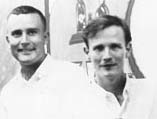 Jack Nichols and Randolfe Wicker, 1964
Jack Nichols and Randolfe Wicker, 1964 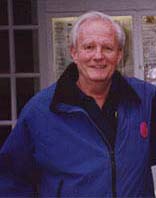 Randolfe Wicker
Randolfe Wicker  Randolfe Wicker as an outspoken activist in the 1960s
Randolfe Wicker as an outspoken activist in the 1960s 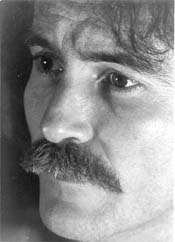 Jack Nichols, 1975
Jack Nichols, 1975 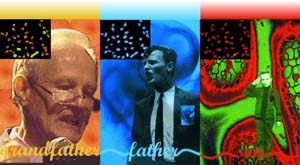 Three views of Randolfe Wicker from the Clone Rights United Front Web site
Three views of Randolfe Wicker from the Clone Rights United Front Web site 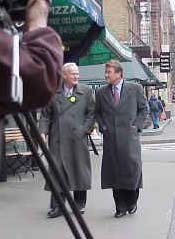 Randolfe Wicker being interviewed by Steve Kroft of 60 Minutes
Randolfe Wicker being interviewed by Steve Kroft of 60 Minutes 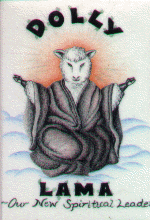 The Dolly Lama: The mascot of the cloning movement
The Dolly Lama: The mascot of the cloning movement